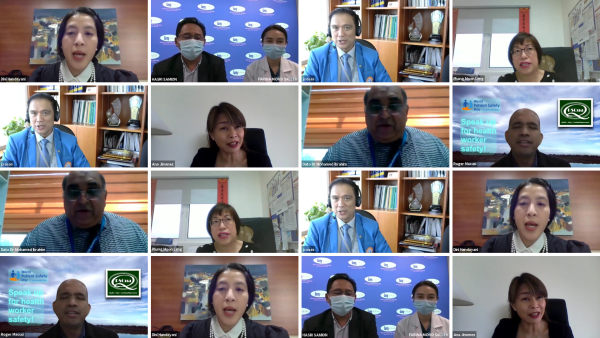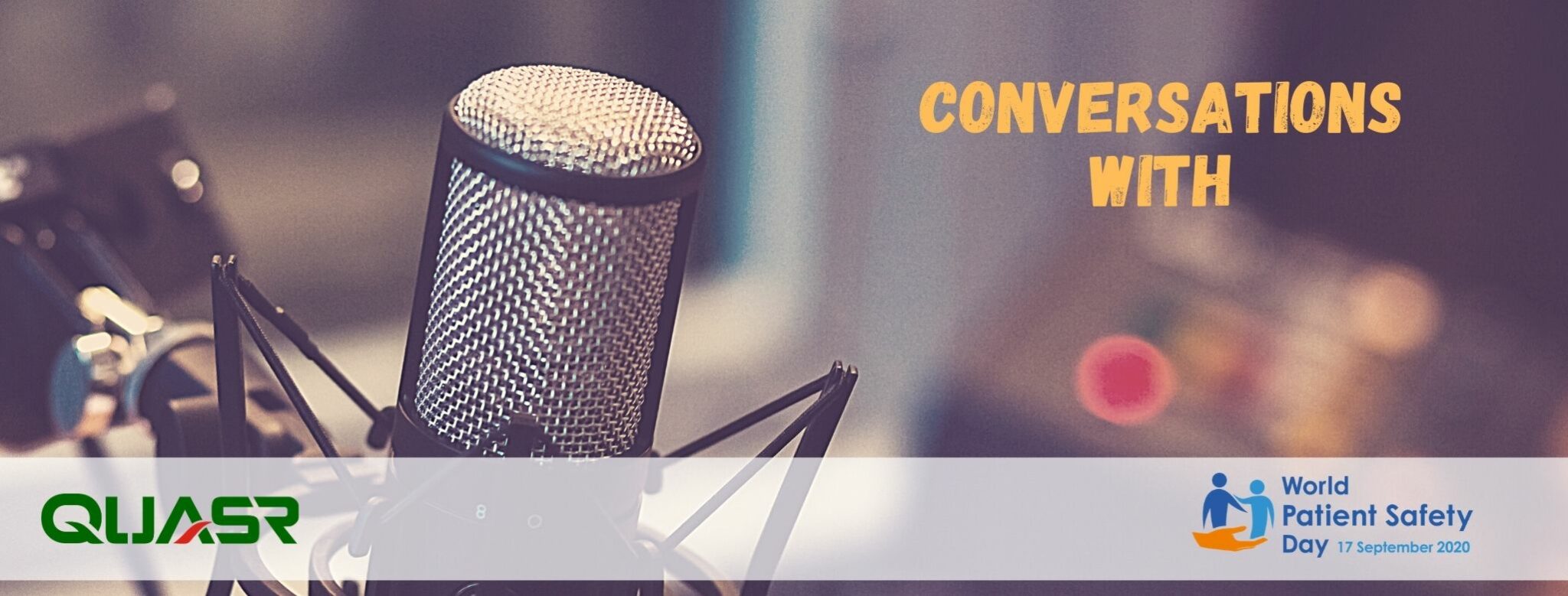In conjunction with World Patient Safety Day (WPSD) 2020, QUASR is organizing a series of interviews with healthcare leaders to share their thoughts and to join the call for action to protect and support health workers.
Ms. Phang Moon Leng is the Chief Clinical Officer of Oriental Melaka Straits Medical Centre (Oriental). Ms Phang began her career in the healthcare industry since 1991. Her wide-ranging experiences includes the administration of both medical and non-medical divisions. Academically, Ms. Phang holds a Master’s Degree in Business Administration and is a certified nursing graduatant. Moreover, she is also a seasoned expatriate, serving faithfully as healthcare administrator in various locations for many years. Upon her return to Malaysia, she joined Gleneagles Medini, Johor as the Senior Operations Manager, overseeing the licensing, commission, and operations of the hospital. Subsequently, she then moved to Parkway Pantai Holdings to serve as the Senior Nursing Quality Improvement Manager.

In this interview, Ms. Phang speaks about Oriental’s commitment to health worker safety, a new initiative to promote a Just Culture and the need to have occupational safety and health (OSH) officers working hand in hand with infection control to ensure a safe workplace. She also shares Oriental’s experience in crisis management and the importance of emergency preparedness, not just for any pandemic but also in dealing with natural disasters.
We take this opportunity to thank Ms Phang for graciously accepting our interview request and sharing her thoughts.
Here is an excerpt from the video interview with Ms Phang
On World Patient Safety Day 2020 theme
Health worker safety is a priority for patient safety. “The theme for this year resonates with me very strongly during these tiring times as we are faced with Covid-19”, said Ms Phang. Our hospital is endeavouring to keep all our health workers safe in order for us to provide a safe environment for our patients and their families and visitors, as well as our internal clients. Given the recent uptrend in Covid-19 cases, as Malaysia sees the third wave, Oriental is giving more emphasis on ensuring health worker safety through the strict practice of safety protocols for all staff.
On patient safety, Oriental has always been focusing on the six international patient safety goals (IPSGs). However, due to the pandemic, the focus this year is mainly on infection control practices. Ms Phang shared that they recently celebrated World Patient Safety Day. Her nursing team put up a special video on IPSGs and some great posters on speaking up for safer care. The event involved clinicians, health workers, patients and their relatives and visitors. For this patient safety event, we also created our own Oriental “Safety Pledge”, said Ms Phang.
Oriental Medical’s ‘just’ culture
Oriental has started a safety culture project aimed at optimising behaviours and safety practices that will result in an improved safety culture and reinforce and support the prevention of patient harm. It is called Just Culture. “In a just culture, we encourage open reporting and participation in prevention and improvement when incidents occur”, Ms Phang explained. Her team is running a series of safety culture in services to make people aware of the importance of speaking up on safety. For instance, if staff feel that they are not being adequately provided with PPEs, they need to speak up. Human errors do occur. We should not hide errors and should be brave enough to report and address them to see how we can use errors as a way for improvement.
“Just culture also means to encourage and give recognition for speaking up, not to penalise. It is not just us leaders who should play a role; everybody should be involved”.
Setting up OSH committee to ensure a safe workplace
Having a safe workplace environment is a pre-requisite for ensuring patient and staff safety. On this, Ms Phang emphasises the need for hospitals to have OSH policies and safety officers. It is important for hospitals to set up an OSH committee to deal with safety hazards in the workplace such as chemicals, radiation and construction and renovation works on hospital facilities. Infection control looks at how to prevent the spread of infectious diseases, while a safety officer looks at the safety of the entire workplace. Both need to work hand-in-hand to create a safe working environment. Ms Phang highlights, “As leaders, we have to continuously strive to improve these two aspects of safety”.
Head-start on pandemic preparation
Due to an influenza outbreak in November and December 2019, Oriental started preparing for sufficient PPEs and closing some entry/exit doors to manage human traffic flow. When Covid-19 pandemic started in February, Oriental further enhanced the traffic flow, screening method and triaging patients, including compulsory screening of patients for OT and hospital admission. “We are also the first hospital registered and licensed to conduct screening and PCR testing”, says Ms Phang. Oriental is now a Covid-19 testing centre in Malacca, running two both PCR and antigen rapid test kits (RTK) testing. “MOH commented that we are the only private hospital to have the flow done correctly at that time”, she says.
Oriental’s experience in crisis management
Oriental is a Malaysian Society for Quality in Healthcare (MSQH) accredited hospital. Ms Phang thinks preparing for emergency and pandemic is a critical part of hospital management. “Part of the MSQH Standard – Prevention and Control of Infection Chapter – talks about pandemic preparedness as well as a disaster manual”. For Oriental, their CEO, Medical Director and safety officers were all involved in the preparation of a pandemic policy – a general policy for any type of communicable disease outbreak. “You don’t just deal with a pandemic as such, but also deal with natural disasters”. Oriental is located next to the Malacca Strait. “This is where risk management comes in. We are located near the sea. If a tsunami or typhoon hits and causes flooding, this is what we will need to do”, said Ms Phang, referring to a crisis manual.
There was an episode of food poisoning at Oriental where several of their nursing college students were affected. With the crisis manual and risk policy, the hospital was able to quickly perform a service recovery and address the issue before public health officers arrived. The latter commented that Oriental took the right steps.
“I’m glad to say we now have a crisis manual, risk manual, pandemic policies, infection control policies and safety policies in place”
On managing health worker safety and wellbeing
In the beginning, the main challenge was to ensure there were adequate PPEs for our staff. There was a fear of our staff getting infected. It was about giving assurance to the staff, particularly the front liners, on their safety. “But after a while, we realised that mental health of our workers is another important aspect (of staff wellbeing)”, said Ms Phang.
“We are still encountering the problem of the public not understanding the importance of complying with safety guidelines while they are in the hospital”. Front liners are getting occasional verbal abuses and outbursts from patients and their relatives. This is one other source of stress, according to Ms Phang.
Front liner workers in a full set of PPE to triage patients can get very tiring and stressful. Staff who are exposed to Covid-19 patients have to undergo a 14-days quarantine and put in isolation, which is a stressful experience. To address staff health and mental wellbeing, Oriental provides food vouchers, rotates the teams, conducts debriefing sessions to hear the concerns of the front liners. “We also have a clinical phycologist onboard to give sessions on how to cope with stress”.
Digital transformation in healthcare
The pandemic has opened our minds on how to reach out and provide care to patients. Many hospitals are trying to go digitally savvy and adapt to the new norm, said Ms Phang. “I think telehealth is one of the new service delivery models many hospitals are exploring, and it is the way forward”.
However, she also cautioned that challenges remain, not only in terms of cost of investment but also the readiness of network infrastructure and internet connectivity in certain areas. Relevant policies and criteria should also be established for wider adoption, while concerns on data security need to be addressed to assure the public. At a recent digital health summit on accelerating digital transformation in healthcare, Ms Phang noted Dr Fazilah, the Senior Deputy Director of the Planning Division from MOH, spoke about revitalising the Malaysian economy, which has been badly impacted by Covid-19, by enhancing our digital technology and innovation. She is looking forward to some help from the government to support telehealth industry.
Reasons for optimism
“We have seen the creativity of our team with regards to innovation, the ability to move forward quickly with a purpose when faced with a situation such as this”.
The pandemic threatens our lives and causes anxieties. The paradox of it is that it has made us healthier and stronger in many ways. It has also helped to accelerate the changes in our behavior as well as our healthcare delivery that hopefully will be a long-lasting journey, said Ms Phang with a sense of optimism.



